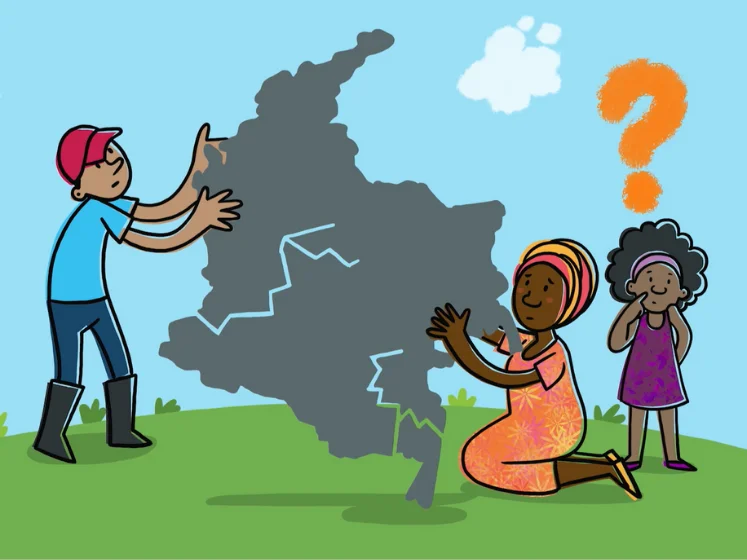The Pathways project incorporated a broad range of knowledge exchange and knowledge sharing, including multiple stakeholders from different sectors of society, including government and policymakers, academics, communities affected by the conflict in Colombia and the wider public.
The project concluded with the organisation of Festivals of Reconciliation in all the communities we worked with. Due to COVID-19 restrictions, these were adapted to multimedia events and outputs including podcasts, webinars, videos and infographics.
Below you will find recordings from events and webinars, blogs, podcasts, papers and more detailing the crucial conversations and topics from our fieldwork.
Events
Society for Qualitative Inquiry in Psychology (SQIP) 2022
This event took place on 18 June 2022
María Cecilia Dedios presented the Life Trajectory Qualitative Interview Guide (LiTraQ) at the Society for Qualitative Inquiry in Psychology (SQIP) 2022 conference.
Seminar of Public Affairs
This took place on 20 May 2022
Natalia Concha and María Cecilia Dedios presented the study results at the "Seminar of Public Affairs" at the School of Government at Los Andes University. The presentation was entitled: 'Forgiveness, Reconciliation, and Future-Oriented Expectations among Young People in Seven PDET Territories’.
Watch the event recording (in Spanish) on Facebook here.
Festivals of Reconciliation
This took place from 10 November - 20 December 2021
Through the Festivals of Reconciliation the project team reported on findings, engaging with the communities where the research was based. This took place through podcasts and webinars, promoted through social media and aired in local and regional radio stations.
Festival events were in Spanish as they were addressed to the local Colombian communities that participated in the research.
Webinar | Caminos hacia la Reconciliación
This event took place on Wednesday 10 November 2021, online.
The webinar disseminated our research findings back to our communities, engaging in knowledge exchange with community leaders and local policy stakeholders.
Speakers: Professor Sandra Jovchelovitch (LSE), Leonel Narvaez (Fundación para la Reconciliación) and Dr Fabio Idrobo with Dr Diego Salcedo (Fundación Santa Fe de Bogotá), accompanied by women community leaders from our territories: Yulima Arias, Luz Mari Cundumí, Fanny Gaviria, Carmen Cárdenas, Flor Alba Arias and local public health and education representatives Flor Alba Zambrano Morillo and Ema Galindo, moderated by our communications partner, Emiliano Restrepo (KeepUp Communications).
Impact: The webinar enabled us to hear from our community leaders and helped establish bridges between the different sectors.
You can watch the recording of this event by following this link.
LSE Public Lecture | Reconciliation Processes in Post-Conflict Societies: Colombia and beyond
This event took place on 5 October 2021
Speakers: Professor Lord Alderdice, Dr Fabio Idrobo, Professor Nicola Lacey and Federico Rodriguez. Chaired by: Professor Sandra Jovchelovitch
Access the podcast recording on LSE Player | Watch the video recording on Facebook
Blogs
Forgiveness as a vehicle to improve wellbeing in post-conflict Colombia, December 20th, 2021, LSE Latin American and Caribbean Centre blog.
Podcasts
We developed five podcasts for each of Territorial Focused Development Plans (PDET) regions where the research took place. The podcasts presented testimonies from our participants, community leaders and our research team: Dr Maria Cecilia Dedios and Dr Natalia Concha (LSE), María Camila García and Dr Diego Salcedo (Fundación Santa Fe de Bogota) accompanied by Leonel Narvaez (Fundación para la Reconciliación).
Access all five podcast episodes (in Spanish) via the following platforms :
Podcast Caminos hacia la Reconciliacion
Spotify
Apple Podcasts
Deezer
All the podcasts were aired by various Colombian local and regional radio stations during 13-21 December, including: Emisora Radio 1040 (Popayán, Cauca), Emisora Ambeima Estéreo (Chaparral, Tolima), Emisora Divina Estéreo (María la Baja, Montes de María), Emisora Innovación Estéreo (San Juan de Nepomuceno, Montes de María), Emisora Ecos del Caguán FM (San Vicente del Caguán, Caquetá), Emisora Comunitaria 104.1 (Florencia, Caquetá).
Seminars
International Seminar: Strengthening leaderships for forgiveness and reconciliation
This event took place from 16 to 21 November 2021 (hybrid)
Our NGO partner Fundación para la Reconciliación hosted the international seminar Strengthening leaderships for forgiveness and reconciliation on 16-21 November 2021 with international practitioners and academics, including Fred Kofman (MIT), Robert Enright (Wisconsin University), Everett Worthington (Virginia University), Donna Hicks (Harvard University), Martin Leiner and Berneth Pena (Kena University, Germany) and our very own, Sandra Jovchelovitch with Fabio Idrobo (Fundación Santa Fe de Bogotá), amongst many others.






